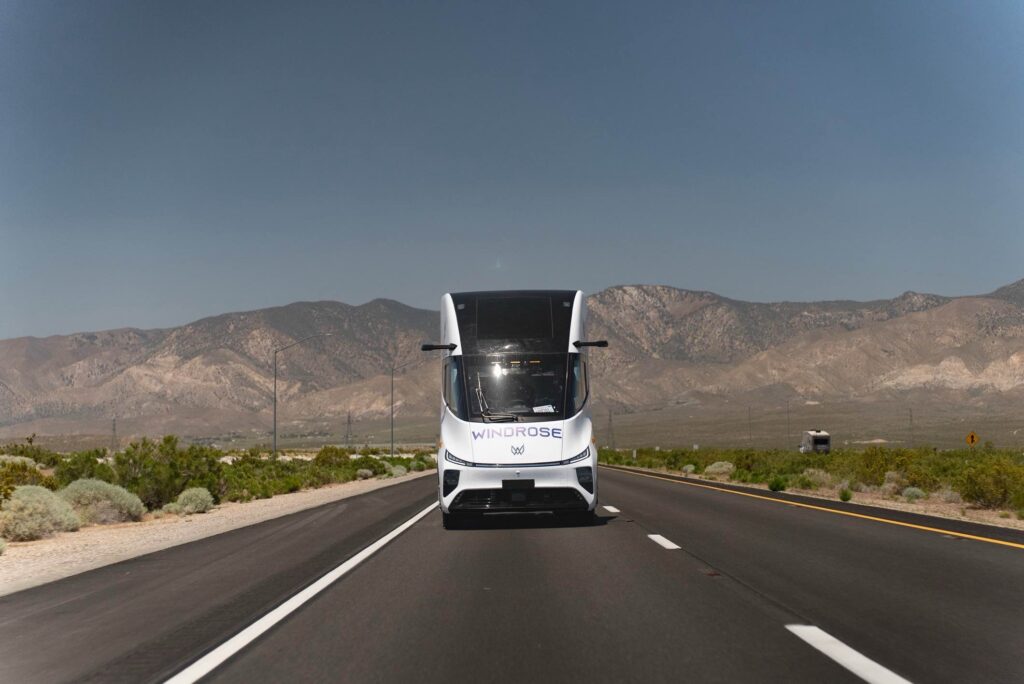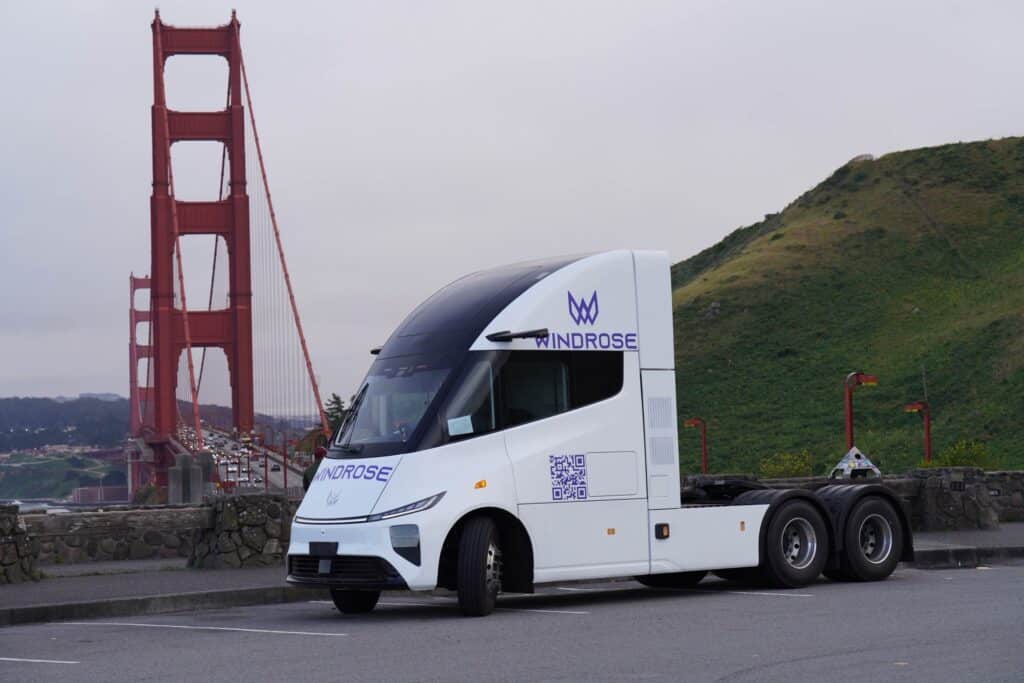China’s Windrose Semi Announces US Plant, Challenging Tesla
Chinese electric semi truck startup Windrose announced plans to set up a U.S. assembly plant for its semi-trucks, with a planned US delivery from 2025. Reuters reported that this move signals a potential return of Chinese electric vehicle companies to the US, the world’s second-largest automotive market.
Windrose is set to establish a U.S. assembly plant in Georgia, marking a significant step in expanding its operations to better serve its American customers. The new facility has been secured and will be responsible for assembling chassis and other vehicle parts that are manufactured in China. This strategic move is aimed at catering to the majority of Windrose’s existing order book, which consists of 6,400 trucks, predominantly ordered by U.S. buyers.
Over the next three years, Windrose plans to manufacture and deliver these trucks, positioning itself to meet the growing demand in the American market. However, the company’s CEO, Wen Han, has not disclosed the specific investment amount for the U.S. plant nor provided detailed information on the exact number of orders originating from U.S. buyers.

EVinfo.net spoke with Windrose CEO Wen Han about how relations between the US and China are affecting Windrose. Han said the tarriffs on heavy duty Chinese produced electric trucks are currently under 30%.
Han said: “It is in everyone’s interest to be building a truly global EV product as well as supply chain. Despite geo-political tensions, we’d like help build up an EV ecosystem in both Europe and the U.S. Belgium in Europe and Georgia in the United States are both top ports with promising business environments.”
In Han’s interview with Reuters, Han said: “The U.S. market is friendly towards Chinese heavy electric trucks based on the fact that the tariffs on imported trucks are much lower than those on cars.”
Han continued, “Many of our clients are U.S. firms, for example, Nike… and we can serve them in their home market.”
EVinfo.net asked Han for his thoughts on the Tesla semi.
Han said: “I respect very much what the Tesla semi has done for the industry. We have been shown side by side next to the semi in Vegas, and will again in Hanover in Germany. I hope they start to mass produce soon so that it’s good for the entire industry.”
Windrose is gearing up to enter the competitive market for heavy trucks, directly challenging Tesla’s Semi with a similarly priced vehicle at approximately $250,000. The new heavy truck from Windrose is equipped with a powerful battery pack exceeding 700 kilowatt hours, designed to deliver impressive performance and range.
Capable of running over 670 kilometers (418 miles) on a single charge while fully loaded at 49 tons, Windrose’s truck aims to provide a robust alternative for long-haul transportation. This substantial range and load capacity make it a strong contender in the electric truck market, offering efficiency and reliability for commercial operations.
By pricing its truck on par with Tesla’s Semi, Windrose positions itself as a formidable competitor, targeting customers who prioritize both performance and value in their transition to electric heavy-duty vehicles.
Tesla has faced challenges in mass-producing and delivering its Semi trucks. As of April, the company had delivered only 36 out of the 100 electric trucks it promised to PepsiCo back in 2017. This delay has led other food distributors and retailers to explore alternative options, turning to rival electric-truck manufacturers to meet their needs, according to a previous report by Reuters.
The slow pace of Tesla’s Semi deliveries has opened up opportunities for competitors like Windrose, which is poised to enter the market with a heavy truck that directly competes with the Tesla Semi. By offering a vehicle with a similar price point and impressive specifications, Windrose aims to capture the interest of potential buyers who are seeking reliable and timely solutions for their electric trucking needs.
Experts Speak Out Against Tariffs
In May 2024, the US Government raised tariffs on Chinese-produced EVs to 100%. This caused great controversy. Political tensions between the two countries was at an all-time high at the time, and have seemed to ease a bit recently. With America waiting for the outcome of the November elections, a lot hinges on the outcome of those elections for the US EV market. Investments by Chinese companies in producing EVs on US soil may be encouraged or blocked, depending on how the political winds blow.
EVinfo.net believes economic growth and jobs in the US would benefit from more Chinese investment in US based EV plants. China’s BYD has grown to become the largest battery electric bus manufacturer in North America, with more than 750 employees in its Lancaster, California plant, since delivering its first electric bus from Lancaster in 2014.
EVinfo.net believes the tariffs are a mistake. All of our automotive expert contacts agree.
Automotive expert Tu Le, Founder at Sino Auto Insights, said: “The US is a very attractive market for foreign companies to enter and that includes Chinese companies. If these companies want to hire Americans to help them build their products then isn’t that a good thing? The US government needs to be clear on what requirements need to be met in order to build and sell in the US and penalize heavily any entities that can’t adhere to those requirements. It pains me to say this but the companies that are being protected by the tariffs need to either step up or get out of the way… because we can either welcome these jobs or see them go somewhere else in North America.”
Bill Russo, automotive industry expert and Founder, Chairman and Board Director of Shanghai, China-based Automobility Ltd., said:
“There is no road to the future of electric mobility that does not travel through China and its highly scaled supply chain. Localization is an essential development on the path to globalization, especially for commercial trucks as these cannot be exported efficiently even in a tariff-free world, which does not exist. EV competition from outside the US is really the only way to get the incumbent players off their collective incremental asses and join the race to the future.”

Windrose Technology Semis Use BorgWarner’s 960kW Megawatt Charging System
In April 2024, EVinfo.net reported BorgWarner New Energy (Xiangyang) Co., Ltd. is advancing the development of 960kW fast-charging infrastructure for electric long-haul trucks in a strategic collaboration with Windrose Technology. This initiative aims to support the efficient operation and rapid recharging of electric trucks, thereby enhancing their practicality and appeal for long-haul applications.
Joining this collaboration is the Goodman Group, a global industrial real estate company, which will likely provide the necessary infrastructure and logistics support. Additionally, sporting goods retailer Decathlon is involved in the project, having already deployed Windrose trucks in China following successful initial road tests. This deployment indicates Decathlon’s commitment to sustainable transportation and their confidence in Windrose’s electric trucks.
The adoption of electric heavy-duty trucks faces substantial challenges, primarily due to battery life limitations and prolonged charging times. In Europe, the most advanced electric trucks are equipped with batteries up to 600kWh, providing a range of up to 500 km (311 miles) on a single charge. These trucks support charging speeds of up to 400kW using the CCS2 charging standard.
In China, the scenario is different, with both unique challenges and opportunities. Common EV heavy-duty truck batteries in China typically have capacities of 280kWh or 350kWh, with a rated voltage of 618V and a current capacity of 400A. These trucks generally support charging power of around 280kW, which is lower than their European counterparts.
Windrose Technology is pushing the boundaries in the electric heavy-duty truck industry with its innovative new generation of trucks. These state-of-the-art vehicles boast a substantial 729kWh battery capacity, enabling them to travel up to 600 km (373 miles) on a single charge, even when fully loaded at 49 tons. This impressive range and load capacity set Windrose trucks apart, addressing some of the key limitations faced by current electric heavy-duty trucks.
By offering enhanced battery capacity and range, Windrose Technology is positioning itself as a leader in the electric truck market, striving to overcome the hurdles of battery life and charging times. This advancement promises to make electric trucks a more viable and attractive option for long-haul transportation, contributing to the global shift towards sustainable and zero-emission logistics.

Electric Vehicle Marketing Consultant, Writer and Editor. Publisher EVinfo.net.
Services